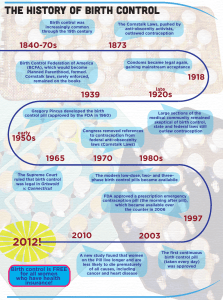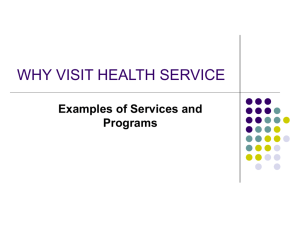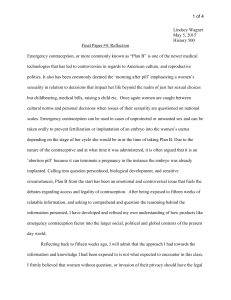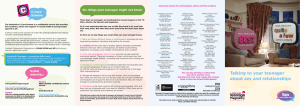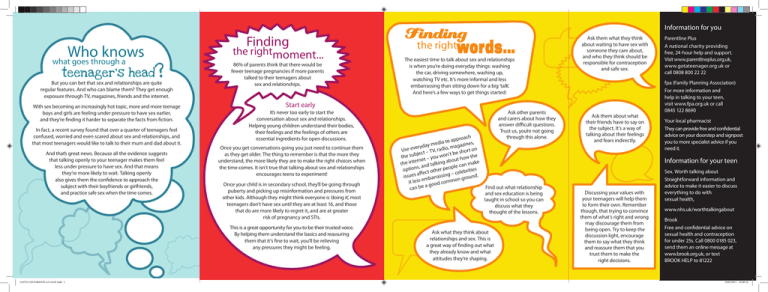
Who
knows
what goes through a
Finding
?
teenager’s head
But you can bet that sex and relationships are quite
regular features. And who can blame them? They get enough
exposure through TV, magazines, friends and the internet.
With sex becoming an increasingly hot topic, more and more teenage
boys and girls are feeling under pressure to have sex earlier,
and they’re finding it harder to separate the facts from fiction.
In fact, a recent survey found that over a quarter of teenagers feel
confused, worried and even scared about sex and relationships, and
that most teenagers would like to talk to their mum and dad about it.
And that’s great news. Because all the evidence suggests
that talking openly to your teenager makes them feel
less under pressure to have sex. And that means
they’re more likely to wait. Talking openly
also gives them the confidence to approach the
subject with their boyfriends or girlfriends,
and practice safe sex when the time comes.
the right moment...
86% of parents think that there would be
fewer teenage pregnancies if more parents
talked to their teenagers about
sex and relationships.
Finding
words...
the right
The easiest time to talk about sex and relationships
is when you’re doing everyday things: washing
the car, driving somewhere, washing up,
watching TV etc. It’s more informal and less
embarrassing than sitting down for a big ‘talk.’
And here’s a few ways to get things started:
Ask them what they think
about waiting to have sex with
someone they care about,
and who they think should be
responsible for contraception
and safe sex.
Start early
It’s never too early to start the
conversation about sex and relationships.
Helping young children understand their bodies,
their feelings and the feelings of others are
essential ingredients for open discussions.
Once you get conversations going you just need to continue them
as they get older. The thing to remember is that the more they
understand, the more likely they are to make the right choices when
the time comes. It isn’t true that talking about sex and relationships
encourages teens to experiment!
Once your child is in secondary school, they’ll be going through
puberty and picking up misinformation and pressures from
other kids. Although they might think everyone is ‘doing it,’ most
teenagers don’t have sex until they are at least 16, and those
that do are more likely to regret it, and are at greater
risk of pregnancy and STIs.
This is a great opportunity for you to be their trusted voice.
By helping them understand the basics and reassuring
them that it’s fine to wait, you’ll be relieving
any pressures they might be feeling.
210793 COI PARENTS A5 LEAF.indd 1
Information for you
roach
to app
a
i
d
e
es,
yday m dio, magazin n
r
e
v
e
e
Us
V, ra
ort o
ject – T won’t be sh
b
u
s
e
he
th
t – you about how t
e
n
r
e
t
ake
ing
the in
nd talk eople can m
a
,
s
n
o
er p
ies
opti
ect oth ing – celebrit .
ff
a
s
e
ss
nd
issu
mbarra
n grou
it less e ood commo
ag
can be
Ask other parents
and carers about how they
answer difficult questions.
Trust us, you’re not going
through this alone.
Ask them about what
their friends have to say on
the subject. It’s a way of
talking about their feelings
and fears indirectly.
Parentline Plus
A national charity providing
free, 24-hour help and support.
Visit www.parentlineplus.org.uk,
www.gotateenager.org.uk or
call 0808 800 22 22
fpa (Family Planning Association)
For more information and
help in talking to your teen,
visit www.fpa.org.uk or call
0845 122 8690
Your local pharmacist
They can provide free and confidential
advice on your doorstep and signpost
you to more specialist advice if you
need it.
Information for your teen
Find out what relationship
and sex education is being
taught in school so you can
discuss what they
thought of the lessons.
Ask what they think about
relationships and sex. This is
a great way of finding out what
they already know and what
attitudes they’re shaping.
Discussing your values with
your teenagers will help them
to form their own. Remember
though, that trying to convince
them of what’s right and wrong
may discourage them from
being open. Try to keep the
discussion light, encourage
them to say what they think
and reassure them that you
trust them to make the
right decisions.
Sex. Worth talking about
Straightforward information and
advice to make it easier to discuss
everything to do with
sexual health,
www.nhs.uk/worthtalkingabout
Brook
Free and confidential advice on
sexual health and contraception
for under 25s. Call 0800 0185 023,
send them an online message at
www.brook.org.uk, or text
BROOK HELP to 81222
18/03/2011 16:08:16
What they
need to know
Contraception
It’s really important to talk to your daughter or son about contraception
and safe sex. That way, when they do decide to have sex they can
make the right choices and not take risks which could lead to an
unplanned pregnancy or a sexually transmitted infection (STI).
Under the NHS, contraception and condoms are free and there are
lots of safe and effective methods that are suitable for young people
– encourage your teenager to visit their local clinic or GP so they can
make a choice that’s right for them. And remember, boys need to
know about contraception too so they can take joint responsibility.
As well as other forms of contraception, young people should
always use a condom as it protects them against the majority of STIs.
A quick guide to different types of contraception:
1) Implant: a small rod can be inserted under the skin on the
upper part of the arm. It contains the hormone progestogen
which temporarily stops ovulation so the woman doesn’t release
an egg for fertilisation. It lasts for up to three years and is
99% effective.
2) Contraceptive injection: contains the hormone progestogen
which stops ovulation so the woman doesn’t release an egg for
fertilisation. There are two types: Depo-Provera (lasts 12 weeks)
and Noristerat (lasts 8 weeks), and both are 99% effective.
3) Combined pill: small tablet taken daily containing two
hormones, oestrogen and progestogen. It stops ovulation so
the woman doesn’t release an egg for fertilisation and it’s 99%
effective if taken correctly.
210793 COI PARENTS A5 LEAF.indd 2
Contraception
4) Progestogen-only pill/mini pill: small tablet containing
progestogen which makes the mucus around the cervix thicker
making it difficult for sperm to get into the womb. It needs
to be taken daily at specific times and is 99% effective
if taken correctly.
5) Intrauterine device: inserted into the womb by a doctor or nurse,
it stops the sperm meeting an egg, and can last between five and
ten years depending on the type used.
6) Intrauterine system: inserted into the womb by a doctor or nurse,
it releases the hormone progestogen, works for five years and is
98-99% effective (depending on the type used).
Other methods include the contraceptive patch (99% effective if used
correctly) and the diaphragm/cap that is placed in the vagina each
time a woman has sex (92-96% effective if used properly). For more
information on the many methods of contraception, visit www.brook.
org.uk
It can also be difficult for a teenager to visit their GP or clinic.
Why not offer to go with your daughter or encourage them to take
a friend to support them. Or, if you have a teenage son, suggest
he talks to his girlfriend about it and visits a clinic with her.
Emergency (after sex) contraception:
If your teenager has unprotected sex, she can take emergency
contraception to prevent a pregnancy. The emergency contraceptive pill
(sometimes called the morning-after pill) can be taken
up to 72 hours after sex, but is much more effective in the first
24 hours so the sooner it is taken the better. It is available from
clinics, GPs and some pharmacies. An intrauterine device can be used
for emergency contraception and can also be fitted up to 5 days after
unprotected sex.
For a list of local clinics where your teenagers can get free
contraception and condoms, visit www.nhs.uk/worthtalkingabout
STIs
Chlamydia is the most common STI. It also has no symptoms
in 70% of girls and 50% of boys, so most people don’t even know
they’ve got it.
Most STIs are easily treated, but can get serious if ignored.
Chlamydia can even lead to infertility.
To get tested for an STI, your teen can contact their nearest NHS
Sexual Health or GUM (genito-urinary medicine) clinic by visiting
www.nhs.uk, or they can also speak to their local GP or pharmacist.
For detailed information on STIs and how to stay protected,
your teen can visit www.nhs.uk/worthtalkingabout
Gay, lesbian and bi-sexual teenager
s
Of course it’s not always about boys and girls – your son or daughter
may be growing up gay, lesbian or bi-sexual and they will also need
good sexual health advice.
,
Homophobic bullying is very common so your teenager will need help
and support and again there are many sources of help. Encourage
your teenager to ask for help by visiting www.stonewall.org.uk or
calling 08000 50 20 20
Alcohol and drugs
It’s also a good idea to talk to them about alcohol. Drinking too much
can lead to unplanned and unprotected sex. For more information
on alcohol and drugs, both you and your teenager should visit
www.talktofrank.com or www.addaction.org.uk
18/03/2011 16:08:18


